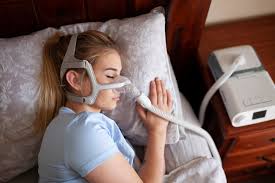
For millions of people with sleep apnea, CPAP therapy is a vital treatment that restores normal breathing patterns. But what happens when the very device designed to help you sleep becomes the reason you can’t?
While CPAP machines are effective, some users experience nighttime disturbances such as frequent awakenings, noise disruptions, air leaks, or discomfort caused by the mask. These problems can undermine the therapy’s benefits and leave you feeling frustrated and exhausted.
CPAP Mask Leaks and Air Pressure Issues: The Hidden Sleep Disruptors
One of the most common causes of poor sleep with CPAP therapy is air leakage from the mask. When air escapes, it can blow onto your eyes or cheeks, causing dryness and irritation. Even small leaks may trigger the machine to increase air pressure automatically, creating an uncomfortable burst of airflow that wakes you up repeatedly.
Mask leaks can occur due to an improper fit, worn-out cushions, or sleeping position changes. To fix this, check that your mask is the correct size and shape for your face. Consider lightweight or headgear-free options like the Bleep DreamPort Sleep Solution, which offers a secure seal without straps or leaks.
Noise and Vibrations: When CPAP Machines Keep You Awake
A noisy CPAP machine can interrupt not only your sleep but also your partner’s. Most modern CPAP devices are designed to be quiet, but over time, blockages in the tubing or filters can make the unit louder.
If you hear whistling or hissing sounds, it could indicate an air leak or a loose connection between the hose and mask. Clean the machine regularly, replace filters on time, and ensure tubing is properly attached. A clean, well-maintained CPAP runs quieter and provides smoother airflow for uninterrupted sleep.
CPAP Discomfort and Claustrophobia: When the Mask Feels Suffocating
Many first-time users report feeling claustrophobic or anxious when wearing a CPAP mask. This discomfort can lead to tossing and turning, removing the mask during sleep, or even avoiding therapy altogether.
If this sounds familiar, start by wearing your mask for short periods during the day to get used to the sensation. Using a low-profile or minimalist mask can also help reduce the feeling of confinement. Remember, CPAP therapy should feel supportive, not restrictive.
Dryness, Congestion, and Mouth Leaks: Physical Disruptions to Restful Sleep
Another frequent issue is dry mouth or nasal congestion caused by airflow imbalance. Without proper humidity, CPAP air can dry out your throat and nasal passages, leading to discomfort that wakes you up.
A heated humidifier or climate-controlled tubing system can add moisture to the air and prevent dryness. If you’re a mouth breather, try a full-face mask or chin strap to prevent air from escaping through the mouth. These small adjustments can dramatically improve your comfort and sleep continuity.
When CPAP Pressure Feels Too Strong or Weak
Incorrect pressure settings can also lead to nighttime disturbances. If the air pressure is too high, it can cause bloating, discomfort, or difficulty exhaling. Too low, and you may still experience breathing interruptions.
Regularly check your CPAP settings with your sleep specialist. Devices like auto-adjusting CPAPs (APAPs) can automatically adapt to your breathing patterns, delivering optimal comfort and effectiveness.
Restoring Peaceful Sleep with the Right CPAP Solution
Your CPAP therapy should help you wake up refreshed—not drained. Most nighttime disturbances can be resolved through mask adjustments, regular cleaning, and improved humidity control. The key is consistency and communication with your sleep care provider.
At BleepSleep, we believe comfort is essential for compliance. Our DreamPort Sleep Solution eliminates straps, reduces leaks, and ensures a peaceful, uninterrupted night’s sleep—so your therapy truly works for you.
Final Thoughts: When CPAP Helps You Sleep Soundly Again
If CPAP therapy is disturbing your sleep instead of improving it, don’t give up. With the right mask, setup, and maintenance, you can enjoy all the benefits of healthy, restorative rest. A few small adjustments may be all it takes to turn restless nights into deep, peaceful sleep.
